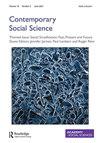Social stratification: past, present, and future
IF 3.9
Q1 SOCIAL SCIENCES, INTERDISCIPLINARY
引用次数: 0
Abstract
ABSTRACT ‘Social Stratification, Past, Present, and Future’ celebrates the 50th anniversary of the annual Cambridge Social Stratification Seminar. This editorial presents a brief characterisation of the ‘Cambridge school’ approach that has featured prominently through the seminar’s lifetime. Then it discusses the domains and topics explored in this issue – education; intergenerational transmission of inequality; family, work and employment; occupations; migration for work; housing, and political preferences. While most of the papers focus on Great Britain, several papers involve international comparisons, one focuses on stratification in India, and another on China. Collectively, researchers reveal how social hierarchy influences people’s lives, and reproduces fairly stably over time. The papers also contribute to understanding the sometimes counter-intuitive outcomes that challenge those charged with policy development.社会分层:过去、现在和未来
“社会分层,过去,现在和未来”庆祝剑桥年度社会分层研讨会50周年。这篇社论简要介绍了“剑桥学派”的方法,这种方法在研讨会的一生中一直占据突出地位。然后论述了本课题研究的领域和主题——教育;不平等的代际传递;家庭、工作和就业;职业;工作移民;住房和政治偏好。虽然大多数论文关注的是英国,但也有几篇论文涉及国际比较,一篇关注的是印度的分层,另一篇关注的是中国。总的来说,研究人员揭示了社会等级如何影响人们的生活,并随着时间的推移相当稳定地再现。这些论文还有助于理解有时与直觉相悖的结果,这些结果挑战了那些负责政策制定的人。
本文章由计算机程序翻译,如有差异,请以英文原文为准。
求助全文
约1分钟内获得全文
求助全文
来源期刊

Contemporary Social Science
SOCIAL SCIENCES, INTERDISCIPLINARY-
CiteScore
6.40
自引率
8.30%
发文量
15
 求助内容:
求助内容: 应助结果提醒方式:
应助结果提醒方式:


